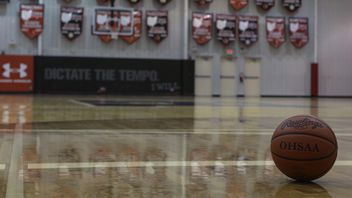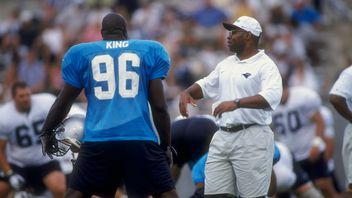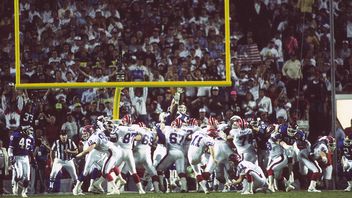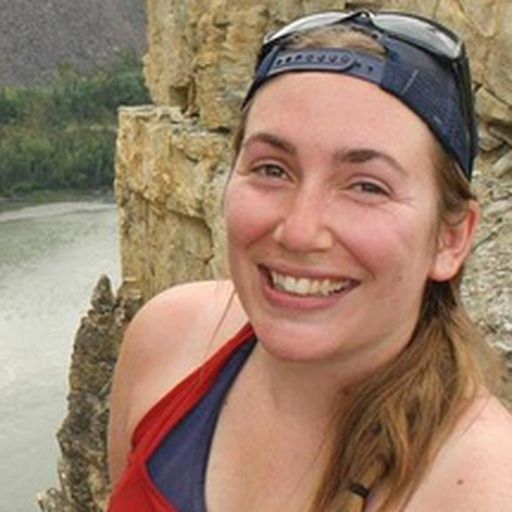The hallucinations started out small, subtle flickers of light at the edges of my vision. “Lightning!” I’d think, and then turn my head to see a cloudless sky. They took firmer shape as the hours passed, acquiring form and color — bright, imagined graffiti tagging the empty rocks of the cliffs that hemmed the river in on both sides of me, or a line of kayaks in rainbow colors spread across the water ahead. Blinking didn’t banish them; even knowing they weren’t real didn’t chase them away. Most often, the visions were logical extensions of my circumstances: Every tree stump on shore became a bear or a moose. Every dead tree floating downriver became a rival boat, a fellow racer to chase down.
The Yukon River Quest is the world’s longest annual canoe and kayak race. It runs each year from Whitehorse, the small capital city of Canada’s Yukon Territory, north for 445 miles (715 km) down the wide, fast-moving Yukon River to tiny, historic Dawson City. Whitehorse sits just above the 60th parallel; by the time they reach Dawson City, boats have crossed the 64th,traversing the territory from just above the British Columbia border almost to Alaska, following the track so many prospectors took in the great Klondike Gold Rush of 1898. Racers can enter in solo or tandem canoes, solo or tandem kayaks, or in giant voyageur canoes, which hold anywhere from six to 10 people — even more if you can squeeze them in. Teams have a maximum of 84 hours — three and a half days — to make it to Dawson City before the cut-off time for official finishers, and they dash downstream without pausing to sleep or to cook a proper meal. They strap CamelBaks loaded with water and electrolyte powder to their backs, pop caffeine pills and painkillers every few hours, and try not to count the ways in which they’ve begun to blister and chafe. And no: for most teams, there are no bathroom breaks. You do what you can from inside your moving boat.
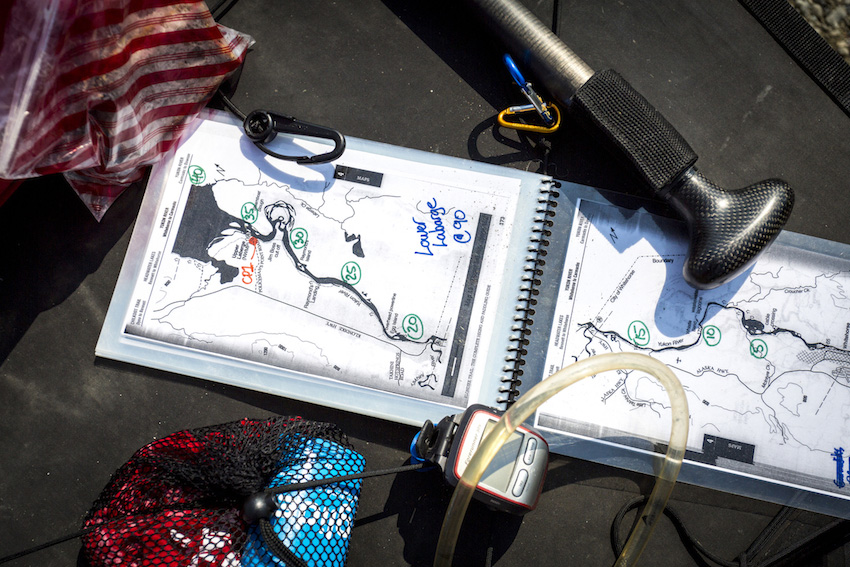
My team was No. 47, a group of eight 20- and 30-something women from Whitehorse. Our captain, Carmen, had put out a call on Facebook for potential racers, and each of us had found our way onto the team through friends or friends of friends. We’d dubbed ourselves the Tough Birches and trained together for seven weeks leading up to the race, hitting the water two or three times a week. Our boat was a large, aging rental, heavily patched from past journeys. We named her Jenny Who’s Been Around the Block.
We’d also given ourselves nicknames intended to convey our fierceness, our toughness, our readiness — or at least those attributes we hoped we would exhibit. Syd, an avid hunter, was registered for the race as Sydney “The Slayer” Van Loon. Vanessa, our designated sternswoman, was Vanessa “Roundhouse Kick” Norris. I’d signed up, aspirationally, under the name Eva “Hellbent” Holland, and I hoped I’d be able to live up to its promise.
In the nearly six years that I had been living and writing in the Yukon, covering endurance, adventure, and extreme sports events had become my specialty. But I’d always been on the sidelines, with a notebook and a camera, living vicariously through the athletes I interviewed. I had never entered a serious competition myself. (A less-than-serious competition? That, I had done.) This past spring, I’d signed up to paddle the River Quest because I wanted to experience the world I so often wrote about. I wanted to see the midnight sun set, and then rise again, on an empty stretch of wild river. I wanted to know what it felt like to hallucinate from exhaustion. I wanted to push my body to a point where I didn’t recognize it anymore. Most of all, I wanted to know: Could I do it? Could I make it all the way to Dawson City? Or would I cry and scream and beg to be allowed to quit partway?
When we left Whitehorse at noon on a hot, sunny Wednesday, armed with water and protein shakes and snacks and rain gear and sunscreen and emergency survival supplies and an arsenal of sing-along songs to carry us down the river, I truly didn’t know what the answer would be.

The start of the race was a blur: a hurried, five-second countdown after the official speeches ran long; a 400-meter dash, in a crush of more than 150 racers, from the grass of a city park down to our boats lined up along a gravel bar; and then we were off, stabbing our paddles into the water, flowing with the crowd of boats out into the main current, jockeying for position as the hundreds of spectators that filled the riverbank cheered and cheered. Soon enough the excitement faded and we settled into a rhythm — Carmen, our team captain up in the front of the boat, had a small battery-powered digital metronome, and she set our pace at 60 paddle strokes per minute, a pace we would keep, more or less, for most of the next two and a half days.
Jenny Who’s Been Around the Block had six seats, hard fiberglass benches that we’d padded with yoga-type mats, and there were eight of us to fill them. Carmen was in the bow, with a narrow bench to herself, and a second Carmen alone behind her. Then came Anna and Syd, on a wide middle bench, and Jacqueline and me behind them. Cristi, alone in the second-to-last seat, and Vanessa, in the stern, rounded out the lineup. The plan was to switch sides every fifteen minutes; those who sat alone would just scooch over to the far gunnels, and those of us sharing a bench would execute an awkward simultaneous climb-over/under maneuver to make the transition. Our seating arrangements had been set according to our weight and, in the case of the bow and stern, according to that paddler’s specific role — setting the pace, or steering the ship. Jacqueline, by coincidence, was my closest friend in the boat, and we had joked that sharing a canoe bench for 50 or 60 hours was likely to make or break the relationship.
We had three and a half hours of easy, familiar river, paddling with the current, before we would hit the first major obstacle of the race: Lake Laberge, the lake whose “marge,” or shoreline, was immortalized in Robert Service’s classic poem, “The Cremation of Sam McGee”:
There are strange things done in the midnight sun
by the men who moil for gold;
The Arctic trails have their secret tales
That would make your blood run cold;
The Northern Lights have seen queer sights,
But the queerest they ever did see
Was that night on the marge of Lake Laberge
I cremated Sam McGee…”
Laberge is 32 miles (50 km) long, big and deep and cold, and even mild wind and weather can whip it up into a nightmare for paddlers in an open boat. Three-foot, four-foot swells are not unusual — six feet is not unheard of. Waves and a significant headwind could burn us out early, even if we didn’t wind up swimming.
But when we passed the rotted pilings of an ancient Mountie outpost at the point where the river met the lake, there was good news waiting for us: the lake was calm, almost glassy, and the sun that had followed us from Whitehorse, pushing the temperature to nearly 80 degrees (27 C), still shone. We fell in with a pack of other boats — a pair of foreign-sounding female kayakers, and all three of the solo canoeists in the race, including Bryan Allemang, a friend of Syd’s who’d flown in from across the country to race, and whom we’d invited to draft off Jenny whenever he liked.
Hours passed. The low, spruce-thick hills that lined both shores were each indistinguishable from the next, but at some point we passed the lake’s halfway mark, the furthest we’d ever paddled in training — and we still felt strong. We gained on, and passed, two of our rival voyageur boats, and then were passed by smaller boats in return. Instead of turning on us, Laberge only seemed to get calmer; the sun hung frozen above the horizon in the endless sub-Arctic evening. Finally, at 10:15 p.m., we reached the end of the lake. There was a checkpoint there, where racers were required to holler their boat number to a shorebound volunteer with a clipboard — stopping was optional. But we’d agreed in advance on a rest, in case the lake was ugly and we needed to regroup, so we turned Jenny’s bow into the shallows and levered ourselves out of our seats for a 15-minute break. We’d been paddling for more than 10 hours.
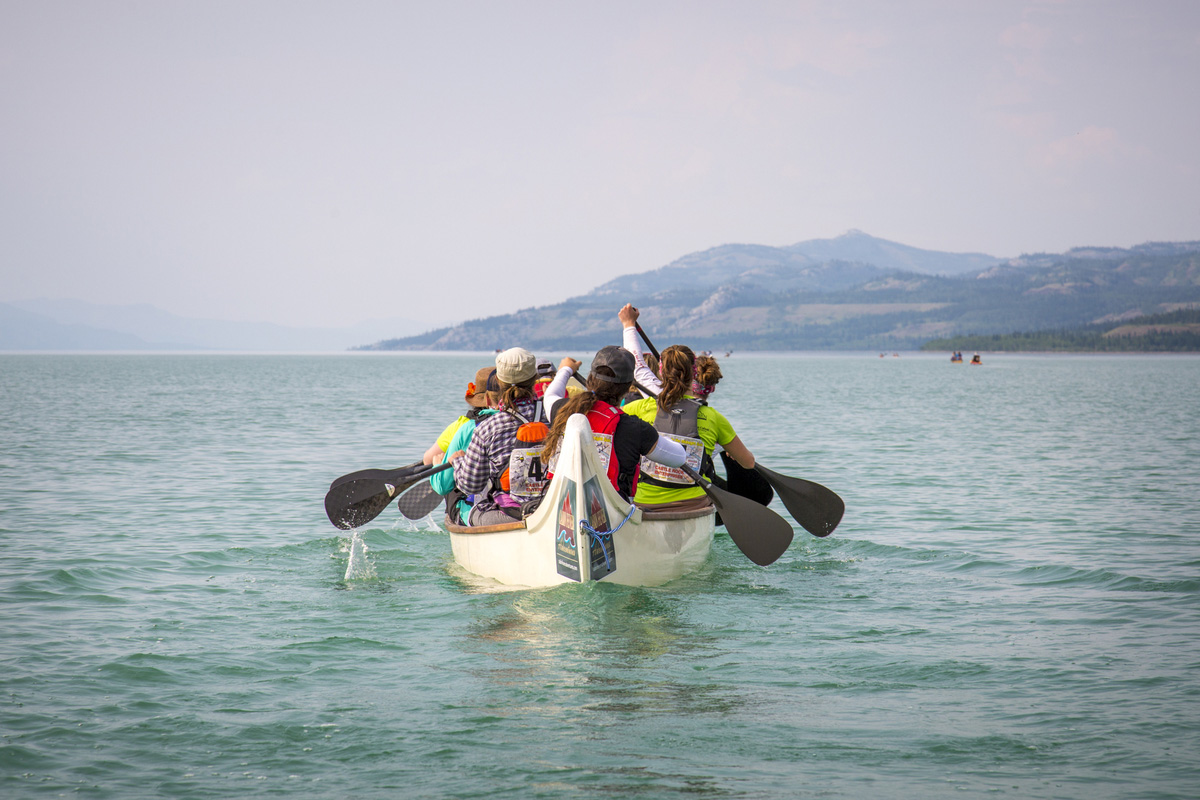
We stretched our arms and legs, gulped some soup, changed out of our light, hot-weather clothes into warmer overnight gear, and passed around a tube of diaper rash cream to soothe the rawness that was already spreading across our butt cheeks. I felt better than I’d expected, or hoped: my arms and shoulders were sore, but in a well-used way, not in an imminent-injury way. I’d avoided sunburn on the lake, and apart from that rawness I had no complaints — a good sign, with easily 50 hours to go. Soon, refreshed, we got back underway, paddling through a narrow, winding section of river as the sun finally dropped below the horizon, the moon rose behind us, and the long twilight took hold.
Midnight, 1 a.m., 2 a.m. It doesn’t get truly dark in the Yukon in late June — merely dim. We sipped water, ate boiled bite-sized baby potatoes and cheese and crackers and energy balls and gummi worms. We peeled away our long johns and squatted over empty plastic buckets to pee, and then emptied the buckets over the side of the boat into the waiting river. We paddled, and paddled and paddled some more.
We occupied our minds with an hours-long game of “Fuck, Marry, Kill” — you know the one. Someone names three people, and everyone has to decide which of them, hypothetically, they’d like to sleep with, wed, or murder. But there were few real-life people that all eight of us knew, and just a handful of local acquaintances. Celebrities were a stretch too — not everyone in the boat was a pop-culture junkie. So we soon fell back on fairy tales, cartoon characters, superheroes and mythical beasts, and the half-dark night was filled with the sound of our giggles.
“Beast from Beauty and the Beast, Aladdin, or Robin Hood as a fox?”
“Beast as a beast or Beast as a dude?”
“Beast as a beast.”
“I guess… I’d fuck Aladdin?”
“Marry Robin Hood, fuck the Beast, kill Aladdin.”
“Agreed.”
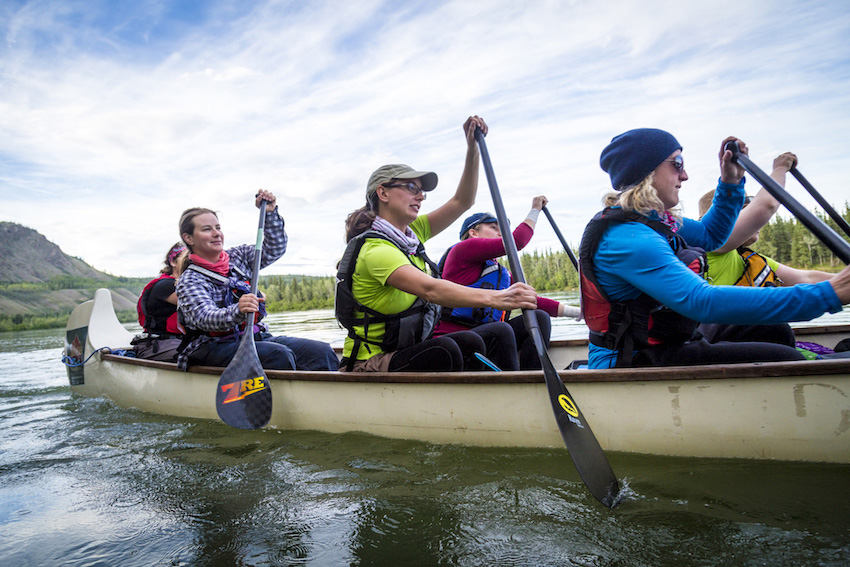
When we’d left the checkpoint, Bryan Allemang was just a few minutes behind us in his little solo canoe. But either we powered ahead, or he fell back, and by dawn he’d lost all track of us. He paddled into a dense morning fog, hoping that we were just ahead.
On the sandy riverbank, a tandem canoe team, “Strokes of Genius,” was stopped for a rest. They had paddled from Laberge straight through the night, without pausing to change out of the light, sweaty clothes they’d worn on the hot lake crossing that day. By the early morning hours, a chill had set in — they were worried about hypothermia, and beached themselves to recover. Hypothermia and hyperthermia, or heat stroke, are common causes of trouble for racers — sometimes paddlers risk both in the same long day. Dehydration and over-hydration stalk the race too, as do repetitive stress injuries, like tendonitis (and repetitive emotional stress injuries, a risk of being in a boat with the same people for 50 hours). Less common, fortunately, are actual river disasters, boats overturned and racers unable to swim to shore. No one has ever died during the Yukon River Quest (although the river has claimed its share of lives at other times), but there have been a few close calls, and each year sees at least a rescue or two. Often, it’s other paddlers who get there first, before the motorized safety boats, which patrol the course, arrive on scene.
The pair had seen us go by maybe a half hour earlier, and soon they heard, rather than saw, Bryan when he passed. “Tough Birches!” He hollered through the fog, filling the emptiness with his voice after a night alone on the dark river. “Has anyone seen the Tough Birches?”
“They went by about a half hour ago!” Strokes of Genius answered through the murk. Bryan paddled on, expecting, hoping, to see us around each new bend in the river.
The sun broke the horizon again around 4:30 a.m., a red disc burning through the cold haze. We were still many hours from the village of Carmacks, a checkpoint just shy of the race’s halfway point where we would take a mandatory — and much-needed — seven-hour rest. As the day brightened, I started to fade. My head nodded forward of its own volition, my eyes slid shut, my chin landed on the top of my lifejacket, and without realizing it I fell asleep mid-paddle stroke. Jacqueline, sitting next to me, had to keep nudging me awake with an elbow or a quick word, so I wouldn’t lose my paddle in the river. We carried some spares, but they were regular canoe paddles — not expensive, lightweight, fiberglass racing paddles like the one in my hands.
The nausea and the stomach pains came next, their source unknown. My body voicing its objections to the ordeal, maybe? I spent the early morning, when I wasn’t nodding off, swallowing back the urge to vomit. I had that sick, spinning feeling that you get when you lie in bed with a bad hangover, knowing that you probably need to make a run for the toilet but lying still, so still, afraid to move.
Then my left wrist flared with pain. I’d gotten tendonitis in my right wrist during training — a result of following through too far for a marathon stroke, then flicking my wrist at the end of each stroke the way I would on a short recreational paddle — but a physiotherapist had eased the worst of it over the course of three pre-race visits, and she’d given me advice on managing it throughout the race. It was taped up and tolerably sore, but now my good wrist was on fire. My strokes got weaker. I was falling apart.
Was this it, then? We were maybe five, six hours from Carmacks. I could make it that far, but feeling this bad, there was no way I could last another day and a half from there, I knew.
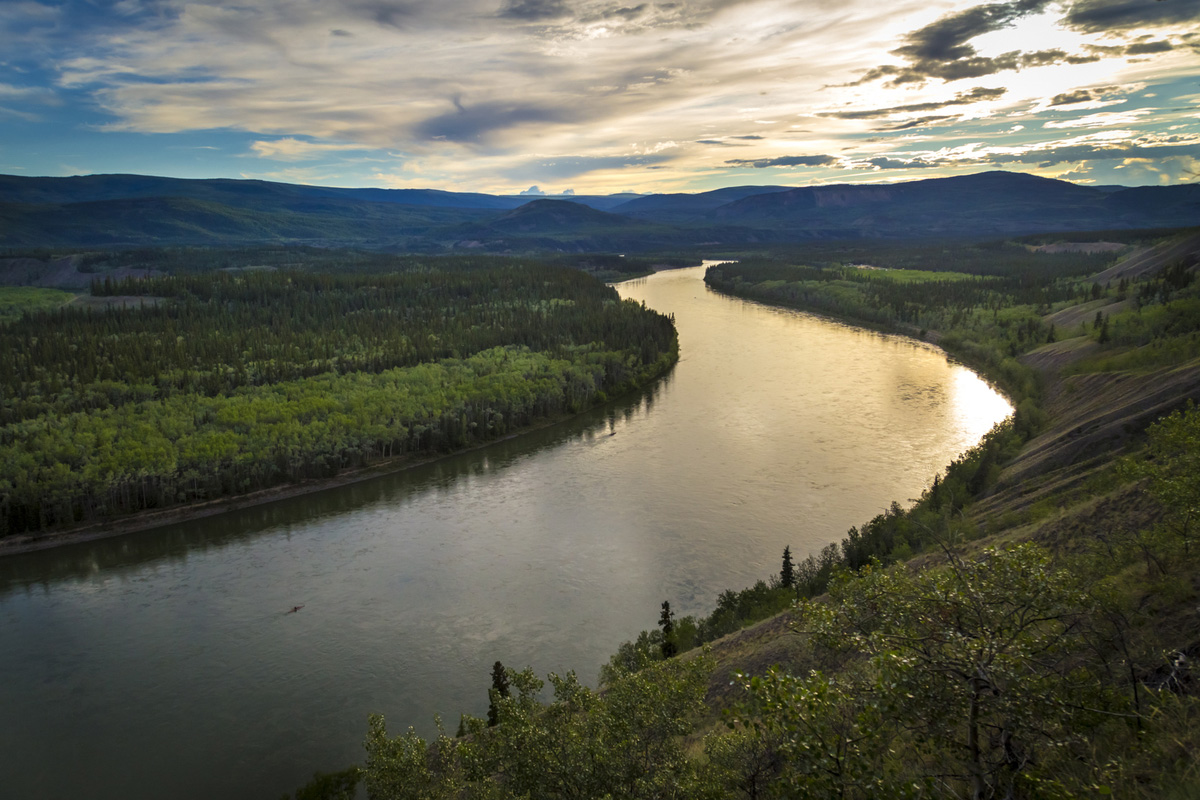
The Yukon River Quest is a younger sibling of the Yukon Quest, the famous 1,000-mile dogsled race that runs from Whitehorse to Dawson City, often shadowing the river, and then crosses over into Alaska to eventually finish in Fairbanks. But while Yukon Quest mushers are allowed to drop off sick or injured dogs at checkpoints, and carry on with their race, I couldn’t be discarded like a dog. In the River Quest, one paddler dropping out means the entire team is eliminated. They’re welcome to keep going anyway, if they can — and the voyageur canoes often do — but crossing the line in Dawson won’t make them official finishers.
A couple of hours passed while I sank into exhausted misery. If anyone else was suffering the same way, I was too far gone to notice — I was alone in my own head. If I couldn’t carry on, I knew, my team faced a choice: drop me, and scratch from the race, or carry my sorry ass all the way to Dawson. Neither option helped my nausea. The river twisted and turned, turned and twisted — it was hard to imagine that we were actually progressing. I paddled half-heartedly, trying to hold my wrist rigid, occasionally glancing over the side, wondering if I should just give in and try to empty my angry stomach into the river.
Then, maybe around 10 a.m., something strange happened: as the day warmed up, my tiredness lifted. I stopped nodding off, and the mist coating my brain seemed to thin. Jacqueline fed me some crackers from her food stash, and I sipped from a bottle of ginger ale I’d brought just in case. At her suggestion, I filled a small drybag with icy river water, put my paddle down for 20 minutes, and stuck my left arm into the bag up to the elbow. It came out numb, and after I’d warmed it up, slowly, with gentle stretching, the fire in my tendons had dampened down to an ache. I picked up my paddle again and rejoined the team, suddenly feeling invincible.
This was the River Quest’s first lesson for me. I had always envisioned endurance events as a battle of attrition between the athlete’s rising tide of misery and the race’s remaining miles. I had imagined that it was a matter of waiting it out, suffering through until the end — hoping that your tolerance for that suffering outlasted your time on the course. I had never, ever imagined that it would be possible to just … feel better — at least, not without a good night’s sleep in a real bed. I hadn’t expected to rally.
As we closed in on Carmacks, I started joking and laughing again. I stopped worrying about whether I would make it all the way to Dawson. Now that I understood my body’s secret — that misery was only temporary, even if I couldn’t really do much to actively alleviate it — I knew that I could get there.
“Okay, okay, I’ve got one. Sasquatch, the Loch Ness monster, and Ogopogo.”
“Which one’s Ogopogo?”
“It’s like the Loch Ness monster but in a lake somewhere in BC. The Kootenays?”
“Nah, in Lake Okanagan.”
“Right, right.”
We made it to Carmacks at 2:17 p.m. on Thursday. With our 15-minute break at the end of Laberge factored in, we’d been paddling for a total of 26 hours, averaging maybe six, seven miles per hour. At 60 strokes per minute, 60 minutes to an hour, 26 hours so far — we’d cleared 90,000 paddle strokes. And our arms knew it.
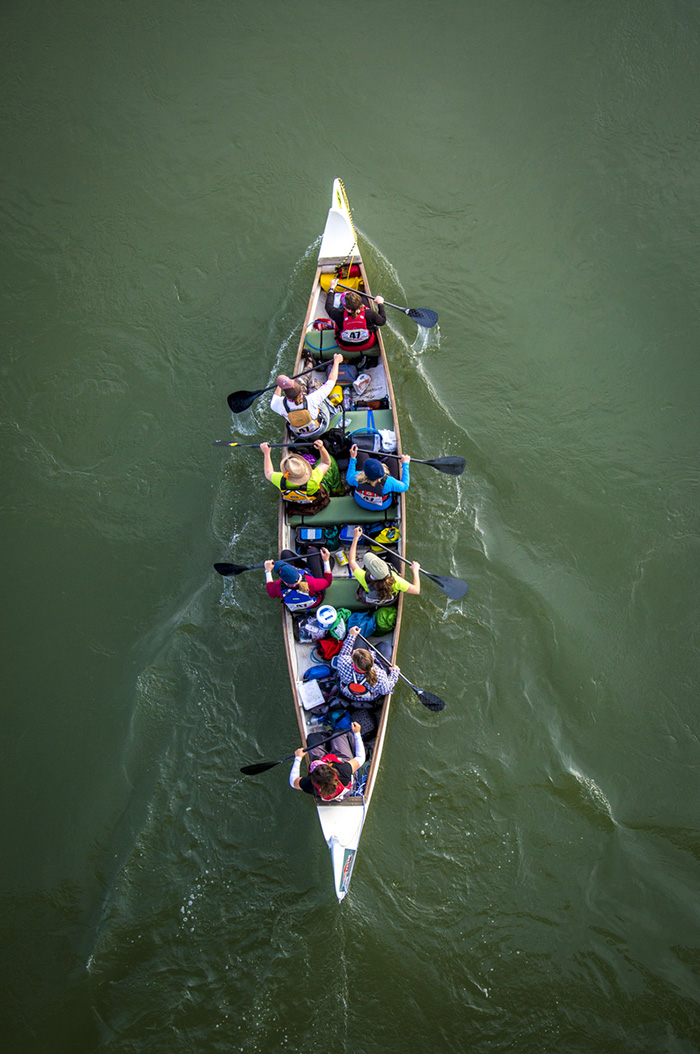
Carmacks is a mid-sized village — up here, that’s about 500 people — spread across both shores of the Yukon River, home to the Little Salmon Carmacks First Nation. By road, it’s about two hours north of Whitehorse on the North Klondike Highway, the route to Dawson City. The village supports two gas stations and a hotel with a restaurant and a bar — a hub, by Yukon standards. It’s also home to a private campground, the Coal Mine, and that’s where all the River Quest action took place.
We paddled up to a dock below the campground, where Jenny’s bow and stern ropes were seized by lifejacket-wearing volunteers — the current was fast here, and they needed to be ready in case they were dragged into the river by our momentum. Then we were helped one by one out of the boat, swaying drunkenly up the dock as we walked for the first time in 16 hours, giddy and laughing at our own incapacitation.
Our support crew — two teammates’ boyfriends and a friend — was waiting for us in the campground. Kaori, a River Quest veteran who’d nearly joined our team, had driven her RV up from Whitehorse. The whole support crew had been there since morning, pitching tents and prepping food, stringing lines between trees for our wet clothes, organizing our resupply bags. We staggered up to find a picnic table laden with buttered bread, scones, cookies, watermelon, orange slices, orange juice, water, coffee, soup, rice, and a slow cooker filled with savory shredded chicken. My morning nausea was forgotten. I ate and ate until it hurt.
After I’d had my fill, I took a five-minute shower in the campground’s communal bathrooms, crawled into the pajamas I’d packed in my Carmacks resupply bag, and laid down on a bed in Kaori’s RV with an ice pack resting between my two sore wrists. I was too wired to really sleep, but I dozed in the warm stuffy air for an hour or two, the sounds of other teams arriving and leaving the campground checkpoint drifting in through the windows. Out of the 57 teams that had started the race — single and tandem canoes, single and tandem kayaks, and the big voyageurs — we were sitting in 28th place.
I woke up in the early evening — we were due out of the checkpoint at 9:17 p.m. — and discovered another River Quest miracle: I felt fine. Good, even. I flexed, lifted my arms above my head, flexed again. I should have needed to sleep for three days after paddling for 26 hours, I thought, but instead I felt rested and ready for more. I’d never plumbed the depths of my body’s capacity for recovery and healing like this before, and I was amazed by what it was capable of.
“I feel like a million bucks!” I said to Jacqueline, giddy as we packed up our gear. We pushed off on schedule, and passed under the blue-painted highway bridge as we left Carmacks behind us. We wouldn’t see another town or village until Dawson City, still a day and a half away. Our next mandatory rest stop, Kirkman Creek, was also the site of a gold-mining family’s homestead. We would be there in roughly 20 hours.
By the time the last boat left Carmacks, the field had narrowed from 57 to 46 teams. One solo kayaker from New Zealand had dropped out of the race at the end of Lake Laberge, on Wednesday night, with a wrist injury. Male kayaker Wolfram Schleicher — whose paddling partner was Germany’s eight-time Olympic kayaking gold medalist, Birgit Fischer — bowed out Thursday morning with a kidney stone. Two of the solo canoeists we’d paddled with across Lake Laberge exited the race, too — the first at Big Salmon, an early morning checkpoint, and the second at Carmacks Thursday afternoon, leaving our pal Bryan as the only paddler in his class, and a guaranteed winner … if he finished. An Irish canoe duo, the Celtic Warriors, arrived in Carmacks an hour past the cutoff time late Thursday evening, and were eliminated.
As is so often the case in extreme adventure and endurance races, it was pretty clear early on who had a chance to win and who did not. The goal for most Yukon River Quest teams wasn’t to win the damn thing anymore: it was simply to finish.
“My butt… does not feel awesome right now.”
“Yeah, I need some butt cream for sure.”
“I think I just need a new ass.”
After Lake Laberge, the next-most-feared obstacle on the Yukon River Quest is Five Finger Rapids, a wide curtain of standing waves divided into several channels by a handful of rock monoliths rising out of the river. It’s been notorious since the Gold Rush, when authorities eventually dynamited a channel below the surface to allow the wood-fueled sternwheelers that plied the river to push through. Modern-day recreational paddlers have drowned there, too. Most River Quest boats make it through unscathed, but the race organizers station motorized safety boats at the bottom of the white water anyway, and every now and then they have to stage a rescue of a capsized canoe and its evicted occupants. As long as competitors don’t accept outside assistance, or hit their SPOT device to trigger a search and rescue, they can keep going after taking a swim.
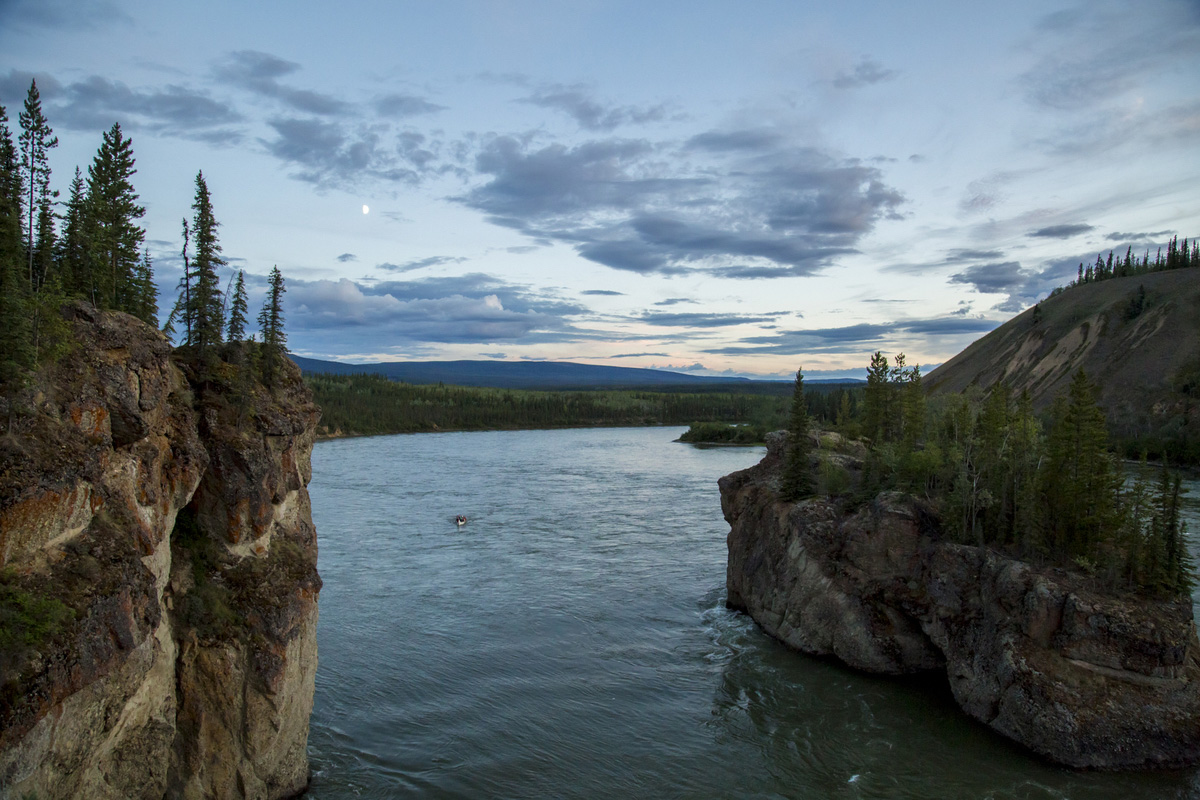
We weren’t too worried about tipping: Jenny was big and stable, and Vanessa, in the stern, had studied video of past races and knew which line to take. Still, our nerves and anticipation grew as we approached the rapids, two and a half hours north of Carmacks. The sun set as we paddled closer, and Carmen, up in front, reminded the group to stay quiet and be ready to respond to Vanessa’s commands. We picked up our force and tempo as we got nearer and nearer — the moon, high above us, lit our way.
“Paddle harder!” Vanessa called out as she steered us to the right channel, and we all dug in. Then we were in it, burying our paddle blades in the unpredictable waves that rose up beside us and then fell away again, losing our synchronization as we all just tried to find water within reach. If anyone said anything, I don’t remember hearing it — I only remember leaning out my side of the boat, staring at the water, trying to jab my paddle in at the right moment to help us move forward. I was vaguely aware of a safety boat in the calm water ahead of us, a photographer on board snapping away, another shooter crouched on the rocks above us. One big wave came over the bow and splashed Carmen, and then, after seconds that felt like minutes, we were through, the river settling down around us again. Carmen’s boat had capsized when she’d paddled the River Quest two years ago, and she’d been anxious to avoid another swim — in the bow, she broke the silence with a scream of relief and exultation.
It was midnight. We paddled on downstream, adrenalin fading, replaced by a quieter satisfaction. Nothing, it seemed, could stop us now.
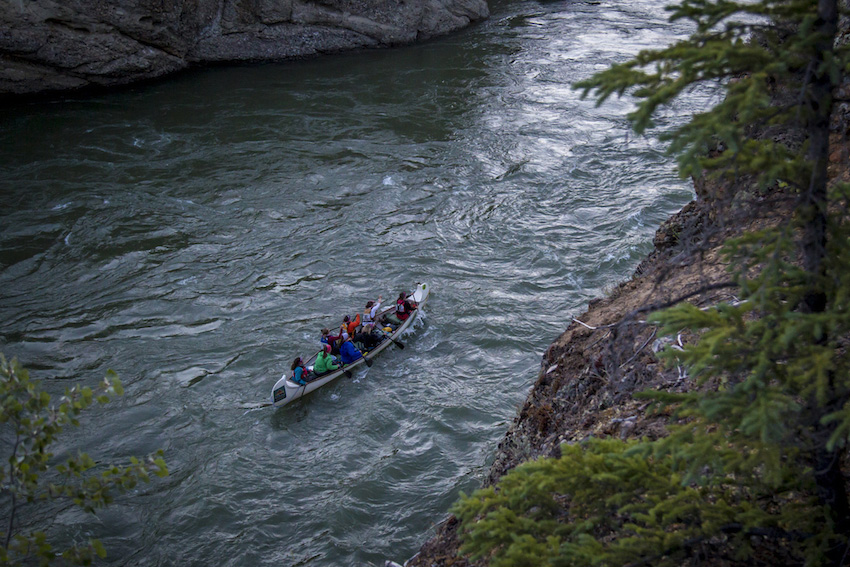
By 2 a.m., the half-dark sky was lightening again, and we could see a haze of forest fire smoke ahead. There was a major wildfire burning near the next checkpoint, Fort Selkirk — a historic trading post from the days when the river was the Yukon’s only highway, a longtime native gathering place that had eventually become a Hudson’s Bay Company outpost, a thriving community, and then a ghost town — and we would be drifting right by it.
By 4 a.m., we were paddling towards a tall mushroom cloud of smoke from the Selkirk fire. By 6 a.m., we were in it — the world turned grey-brown, and the sun, when it rose, was invisible. Our lungs seemed unaffected, so far, but I was fading again, fighting my eyelids as they tried to go with gravity. At the same time, my legs were wide awake, agitated and antsy. They quivered with the need for action to match the effort I was demanding from my arms, shoulders, and core. I was suddenly desperate to stretch my legs, to do some squats or lunges, to walk or run. For a brief, incoherent moment, I felt certain I could breeze through a marathon if someone would only let me out of the boat.
“What did you think you signed up for?” Vanessa asked me from the back of the boat when I complained aloud. I thought about her question, although I sensed she’d meant it rhetorically. Whatever vision I’d had of what the race would be like, I couldn’t remember it anymore.
Smoky morning rolled into smoky afternoon. We heard occasional thunder in the distance. We donned our rain gear in time for a light drizzle to start falling. We played leapfrog with a pair of tandem kayakers, passing them in the maze of islands and channels before being passed again in return. We were in Klondike gold-mining country now — miners still worked the creeks that tumbled into the river on either side of us, as they had for over a century, and Syd, a geologist, knew the name of every one. We peered through the rain as she pointed out Coffee Creek, home to the Kaminak project — the gold strike that had kicked off a second Yukon gold rush a few years earlier.
We arrived at Kirkman Creek just after 5 p.m., in a steady rain. We would observe a three-hour mandatory rest here before tackling the final stretch of river. The homesteaders who owned the place served us soup and sandwiches, and then we rolled out sleeping bags under a large tarp, in a crowd of sleeping paddlers who’d gotten there ahead of us. I closed my eyes as the rain pounded on the plastic above me, and unlike in Carmacks, I slept soundly.
“I pulled into Nazareth, was feelin’ about half past dead
I just need some place where I can lay my head
“Hey, mister, can you tell me where a man might find a bed?”
He just grinned and shook my hand, “no” was all he said.”
We left Kirkman just past 8 p.m., a few minutes after our permitted departure time, hollering thank-yous to the volunteers over our shoulders as we moved into the current. The rain kept falling, and falling. It would be at least 10 more hours until we reached Dawson City, and my frayed mind had latched onto one certainty: I was afraid of the long, cold, wet night ahead. “Afraid” might not even be the right word — it was a dread, sitting heavy in my gut. It was the moment of fear right before you flinch, that voice in your head that says, “This is a terrible idea. Save yourself.”
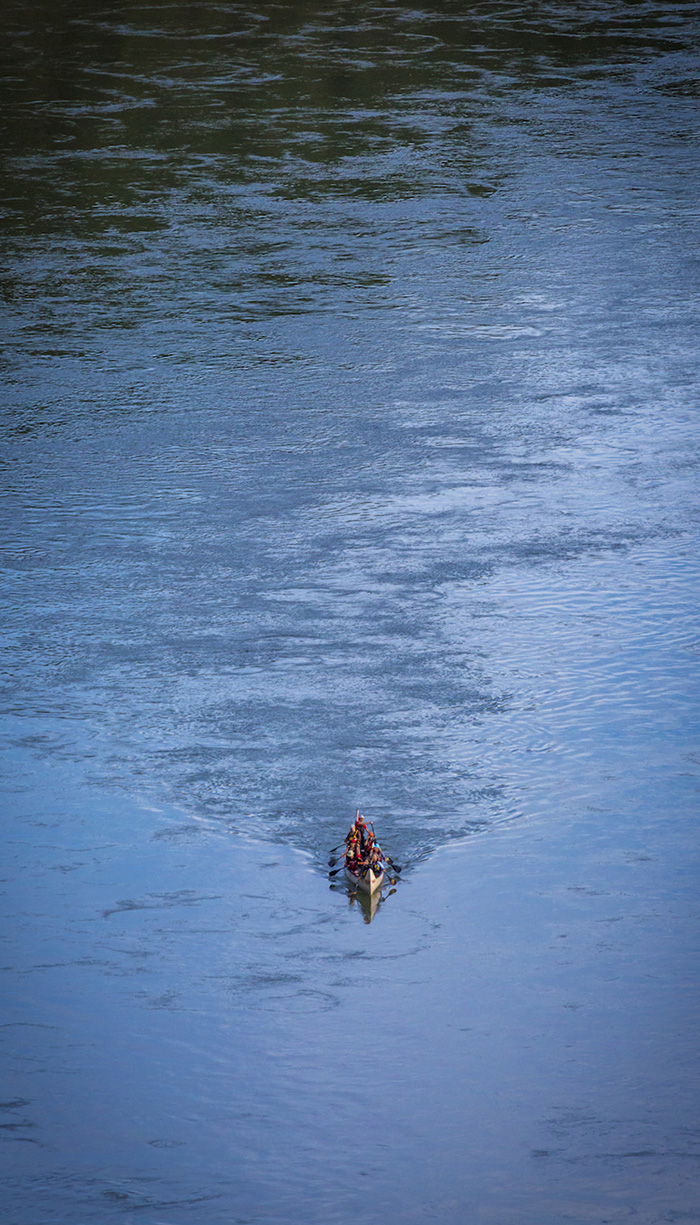
In the last few years I’ve managed to get heat stroke twice, and hypothermia once — that, coupled with the death of a friend from heatstroke, has left me paranoid about my body’s core temperature the way some people are irrationally, fixatedly afraid of bears, or sharks, or lightning strikes. “You’ll be fine,” someone in the boat told me as I shivered in my rain gear, vainly trying to remember everything I’d been taught in a hunter education course about how to identify the advancing stages of hypothermia — shivering, clumsiness, nausea, fatigue, confusion, just about everything I had already experienced and then some. “I know,” I said. But I didn’t know, not really. I couldn’t drum up any confidence, any certainty.
I added layers until nothing more would fit under my Gore-Tex coat and pants. I changed wet gloves for dry ones, pulled on a wool toque with ear flaps underneath my hood. The rain soaked through everything. I tried to remember to eat and drink, knowing that keeping my body fueled was the surest way to keep it warm. I stood up in the boat when I could, shaking my arms and legs to bring the life back into them. I wondered why everyone else didn’t seem to be shivering the way I was.
Around 2 a.m., we reached 60 Mile, the last checkpoint before Dawson City. There was nothing much to it: a couple of volunteers on a sandy shore, keeping a fire burning through the night. We paused long enough for everyone to hop out and change into fresh clothes if they needed to — I put on my last dry long johns, my last dry socks, borrowed a dry top layer from Carmen to wear under my damp fleece and Gore-Tex. I did jumping jacks by the fire until it was time to begin the final push to Dawson City.
I’d like to say that those last four, five hours on the river were magical, triumphant — that I transcended my pain and exhaustion and finished the race brimming with new self-knowledge. But from everything I can piece together in my exhausted half-memories, they were miserable. The rain never let up, and a headwind came and went. Complicated navigational demands — we passed through a maze of braided channels, with hidden rocks and sandbars lurking everywhere — kept a low-intensity current of anxiety running through the boat. Moods soured, and our patience with each other wore thin. To pass the time and keep our minds occupied with something other than our own pain, Jacqueline and I sang every song we could dredge up the lyrics to, until the others got tired of our broken, half-remembered verses and choruses and, with impressive politeness, asked us to stop. Syd, second from the bow, and Vanessa and Cristi, our steering and navigational tag team, were as relentless and unflagging as they had been since we started. But the rest of us were dragging, and took turns pausing to rest a sore muscle or stretch out a stiff one.
I was nodding off again. All I wanted in the world was a 20-minute nap — 10 minutes, even! But I knew stopping to rest would mean letting my body cool down, and would only prolong the race for all of us. Still, my eyes kept sliding shut.
“Dig deep, Eva,” Vanessa said from behind me.
“I just can’t stop falling asleep,” I said blearily. “It’s not a muscle thing.”
“I know it’s not a muscle thing,” she answered. “It’s a soul thing.”
That prickled me awake. Half under my breath, I muttered, “Well that’s pretty fucking condescending.” By now, my emotions were stretched thin and brittle: I was abruptly, violently angry, but I was also mortified, and both feelings were amplified, distorted by my exhaustion — they banged and crashed around inside me like I was a teenager going through puberty again. I didn’t want to be the one dragging my ass towards the finish line while the others soldiered on, I thought. I didn’t want to be a liability. My biggest fear, before the race, hadn’t been for exhaustion or cold or pain — it had been a fear of failing to contribute my share of paddle power, of not being tough enough, of letting the team down. And now it seemed to be coming true.
The confusing thing was, even as I struggled, I was amazed at myself and how far I’d come. Including our 10 hours of mandatory stoppage time, we’d been on the river for more than 60 hours now, and covered nearly 450 miles. In that time, I’d slept maybe a total of two, three hours. And here I was, still paddling, still more or less coherent — if strangely fragile, and a little fuzzy around the edges — and feeling like I could keep going until the finish. I wasn’t as strong and as tough as Vanessa or Syd, true, but I was so much stronger than I had known myself to be.
Apart from my pursuit of a writing career, I had never been truly relentless about anything in my life — “hellbent” was not a word that had ever been used to describe me. I wasn’t someone who racked up personal bests in races, who was driven to compete against myself or to measure and prove myself against others. A whitewater paddling instructor had once asked me, after I declined the opportunity to solo a rapid I didn’t feel ready for, whether I would feel badly about myself later if I didn’t try it. And I could tell her, honestly, that I wouldn’t. I’m just not built that way. So, yeah, I was impressed with myself and my performance in this race. I was proud.
Twice more, in those final couple of hours, I went to put my paddle down for a quick stretch or a rest and heard Vanessa urge me from behind to keep going, frustration and — it seemed to me — contempt thick in her voice. As we neared Dawson City, I seesawed between pride and excitement, anger and humiliation and shame. Why was I being singled out for reprimands? The others around me were taking breaks, too. We were all limping to the finish line.
I sank deep into my own head. Had I done something to offend her? Or was my effort really so sub-par, so genuinely worthy of disgust? Insecurity crept up my throat, choking me, then was shoved back down again by resentment. My thoughts moved slowly, congealing. I didn’t trust my own reactions, anymore — nothing really made sense.

Maybe she thought she was being encouraging, and didn’t notice her tone? Or maybe she actually was speaking kindly, encouragingly, and the contempt I heard was a new kind of hallucination, a product of my own fears? Maybe, in her own barred cell of exhaustion, she couldn’t stop herself from calling me out anymore than I could stop myself from nodding off as I paddled? Maybe some careless word I’d said to a teammate was tormenting them too, at this same moment, in this same way?
I tried to hang on to the pride I felt in my own accomplishment, tried to ignore the flickers of disappointment and sadness as I realized that in this boat full of women I admired so much, some of them might not be admiring me in return. I hoped that later, when I’d rested, when I wasn’t quite such a volatile mess, I would be proud of myself, and them, in a more pure, undiluted way.
But for now, as the final hour of the race wound down, my feelings were more complicated. I don’t want to speak for everyone else in the boat that long morning, but I suspect that if we’d all been asked to play “Fuck, Marry, Kill” one more time, only this time with our teammates as the fodder, it would have been a bloodbath.
Somewhere far ahead of us, the first teams had reached Dawson City on Friday evening, while we were still snoozing under a tarp in rainy Kirkman Creek. As our long damp night wore on, I had no energy to worry about who had won the fucking thing, and when. But if you must know: A pair of male tandem kayakers, team Time to GO!, finished first, in 44 hours 51 minutes and 7 seconds (not including the ten hours of required rest), with a pair of veteran male canoeists coming in 40 minutes later. Another pair of kayaking men crossed next, and in fourth place was the first voyageur canoe, the all-female Team 3-2-1-Go, who we hadn’t had a sniff of since they barged past us at the start in Whitehorse. They beat out the first solo male kayaker by just 13 seconds, leaving him to settle for fifth place.
Meanwhile, somewhere behind us as we struggled along, two more teams had dropped out of the race in its final hours. And Mick Dawson, one of four British ex-military solo kayakers racing to raise money and awareness for veterans with PTSD, had executed the year’s lone racer-on-racer rescue of another competitor, who’d overturned his boat. Dawson would eventually finish in 40th place on Saturday night, and earn the River Quest’s “Spirit of the Yukon” award.
Dawson City appeared on the right riverbank out of a long, gray, murky dawn. It was not yet 8 a.m. on a Saturday, and the walking path along the top of the embankment that fronted downtown, protecting it from spring floods, was abandoned as we swept downstream towards the finish line. The dike hid most of the town from us: we couldn’t yet see the bright-painted wooden facades of the century-old buildings, the boardwalks lining the dusty dirt streets. We couldn’t see Diamond Tooth Gertie’s gambling hall, where the can-can girls still danced each night, or the old brothel, Bombay Peggy’s, turned genteel boutique inn. Two lone figures stood on shore: Joe, Syd’s boyfriend, who’d fed us in Carmacks, and Matt, Jacqueline’s partner, who would drive many of us home to Whitehorse in his van. They’d been waiting for us all through the long rainy night — they pulled their hands out of their pockets and clapped as we neared the shore, a welcoming party of two.
We climbed out of the boat, soaked and shivering, and left Jenny in Joe’s care while Matt drove us to the hotel. In my room, I stripped off all my sopping wet layers and stepped into the shower. It was over. My muscles were sore, my wrists were swollen, my brain was foggy, my butt cheeks were welted, and my emotions were a raw tangle.
But I had my answer: I could do it, and I had done it, and I can say that now and know that it is true. I had paddled a canoe 445 miles in just under 58 hours, through an unpeopled wilderness that tens of thousands of gold-seekers had passed through 120 years before, risking their lives and their life savings on a gamble or a whim. I hadn’t always been my most graceful, indomitable self, but I had done it.
As the hot water washed over me, I closed my eyes and swayed to the remembered rhythm of a canoe moving down the river.
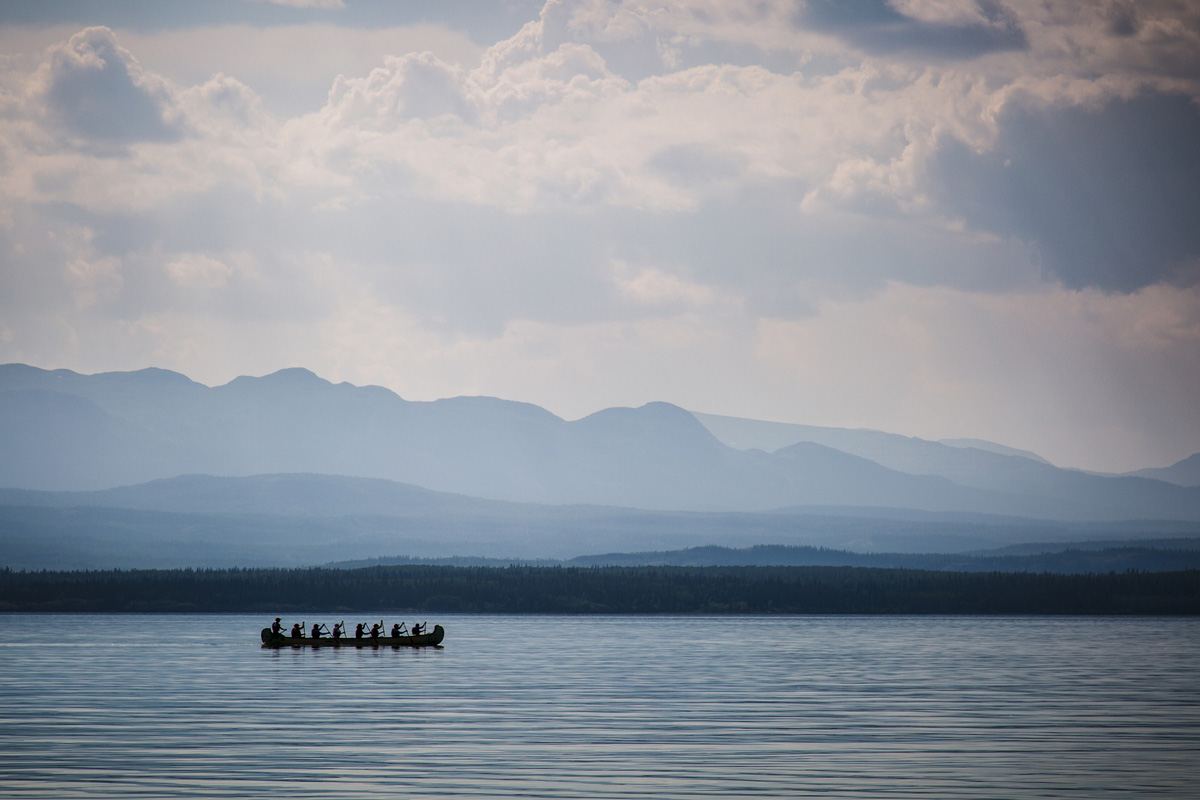
_______
Of the 57 boats that began the 2015 Yukon River Quest, only 44 completed the race. The Tough Birches finished in 25th place, with an official time — not counting the 10 hours of required rest — of 57 hours, 42 minutes and 5 seconds. Bryan Allemang was the lone solo canoeist to complete the race, in a time of 62 hours, 13 minutes and 36 seconds.


